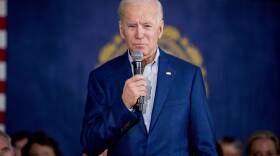EXPLORE MORE
Coming up Friday on BPR, live from the BPL:
Media maven Sue O'Connell
Live Music Friday: husband and wife musicians Will Nelson Jr. & Loren Benn
Boston University media researcher Joan Donovan
Love Letters columnist Meredith Goldstein
Recent segments
-
Elizabeth Warren Makes Her Super Tuesday Pitch To Mass. Voters
The Massachusetts Senator called in to “Boston Public Radio” on Monday for a quick interview. -
Steve Hoffman: Cannabis Control Commission Is Seeking Help From Beacon Hill To Make Marijuana Industry More Equitable
While the CCC is supposed to make sure people affected by the war on drugs are included in the state's legal market, they can't regulate the agreements made by individual cities and towns. -
US Deal With Taliban Has 'Inherent Flaw' And 'Is In Trouble,' Says Charlie Sennott
The United States and the Taliban agreed to a deal over the weekend that could close the conflict in Afghanistan. -
Joanna Weiss And Adam Reilly On Joe Biden's South Carolina Victory
What does Joe Biden's South Carolina mean for his momentum as more than a dozen states prepare to vote on Super Tuesday? -
Emily Rooney: Do Endorsements Matter Anymore?
The New York Times endorsed both Warren and Klobuchar, and no major paper has endorsed Sanders, but he's the front runner going into Super Tuesday. So what gives? -
Callie Crossley: 'Black Voices For Trump' Attempts To Win Over Voters In Swing States
President Trump is trying to win over a few key voters to gain an advantage over his future Democratic rival.
Listen to previous shows
-

BPR Full Show: Love in the Bread Aisle
Today on Boston Public Radio: We begin the show by talking with listeners about rising costs amid inflation. Art Caplan discusses the World Health Organization’s (WHO) upcoming assessment of monkeypox as a potential global health emergency. Caplan is the Drs. William F. and Virginia Connolly Mitty Professor and founding head of the Division of Medical Ethics at NYU School of Medicine in New York City. Shirley Leung talks about efforts to build greenspace in Boston’s Seaport neighborhood, and the potential for safe consumption sites in Mass. Leung is a business columnist for the Boston Globe. Miles Howard shares his 25-mile Boston trail map, which connects green spaces across more than a dozen neighborhoods. Howard is a Boston-based journalist and author of the “Mind the Moss,” a newsletter about hiking. Then, we talk with listeners about their favorite hiking trails in the Boston area. Mitra Kalita discusses the role of the diversity officer in corporate spaces, and the transition of diversity, equity, and inclusion from human resources to the C-suite. Kalita is the co-founder and CEO of URL Media, a network of Black and Brown news and information outlets. Andy Ihnatko updates us on the latest tech headlines, focusing on the Google engineer claiming that Google’s AI language model is sentient. Ihnatko is a tech writer and blogger, posting at Ihnatko.com. We wrap up the show by asking listeners about the regional fascination with Market Basket. -

BPR Full Show: On the bright side....
Today on Boston Public Radio: We begin the show by asking listeners if they’re feeling positive about the state of current events. Trenni Kusnierek talks about last night’s Celtics loss, the suspension of several players from the PGA and Amy Schneider throwing the first pitch at the Giants-Dodgers game. Kusnierek is a reporter and anchor for NBC Sports Boston, and a weekly Boston Public Radio contributor. Juliette Kayyem reacts to the Jan. 6 hearings and the Senate’s potential gun deal. Kayyem is an analyst for CNN, former assistant secretary at the Department of Homeland Security and faculty chair of the homeland security program at Harvard University’s Kennedy School of Government. Quincy Roberts Sr. explains his new role as Executive Director of LGBTQ+ Advancement, and his past experiences and advocacy in Boston. Roberts is is the inaugural Executive Director for the Mayor’s Office of LGBTQ+ Advancement in Boston and co-founder of the Hispanic Black Gay Coalition. Then, we ask listeners to debate the merits of eating alone. Corby Kummer discusses the James Beard awards and their efforts to diversify, obstacles facing young farmers and Rhode Island becoming a restaurant hotspot. Kummer is executive director of the Food and Society policy program at the Aspen Institute, a senior editor at The Atlantic and a senior lecturer at the Tufts Friedman School of Nutrition Science and Policy. John King shares his insights about the Jan. 6 hearings and Joe Biden’s potential 2024 run. King is CNN’s chief national correspondent and anchor of "Inside Politics,” which airs weekdays and Sunday mornings at 8 a.m. We end the show by continuing the conversation about eating alone. -

BPR Full Show: The hearings, day two
Today on Boston Public Radio: Juliette Kayyem previews day two of the January 6 hearings. Kayyem is an analyst for CNN, former assistant secretary at the Department of Homeland Security and faculty chair of the homeland security program at Harvard University’s Kennedy School of Government. Then, we air the House Select Committee Hearings on the Jan. 6 insurrection. Andrea Cabral shares her reactions to the proceedings. Cabral is the former Suffolk County sheriff and secretary of public safety, and former CEO of the cannabis company Ascend. Michael Curry discusses whether he thinks former president Donald Trump will be prosecuted, and how he thinks Trump supporters will react to the hearings. Curry is chair of the NAACP Advocacy and Policy Committee, and is president and CEO of the Massachusetts League of Community Health Centers. We end the show by taking calls from listeners on their reactions to the hearings. -

Corby Kummer: Free School Lunches Set to Expire June 30
Pandemic-era federal waivers that expanded children’s access to food through year-round, free school lunches are set to expire this month, after Congress failed to extend the waivers past their June 30 deadline. A cumulative 4.3 billion meals were distributed through the program over the last two summers. “Now parents have to go back to filling in humiliating applications saying, ‘Here's what money we make and why we need help from the school lunch,’” Kummer told Boston Public Radio on Friday. “What parent has time to do that, let alone wants the stigma of their kid asking for this kind of assistance?” Kummer is executive director of the Food and Society policy program at the Aspen Institute, a senior editor at The Atlantic and a senior lecturer at the Tufts Friedman School of Nutrition Science and Policy. -

John Rosenthal on America's Gun Violence
John Rosenthal, co-founder of the Boston-based nonprofit Stop Handgun Violence, joined Boston Public Radio live at the Boston Public Library on Friday to share his thoughts on America’s inaction on gun violence.









